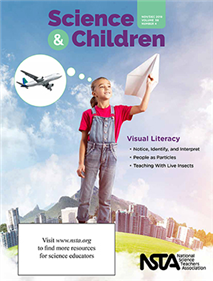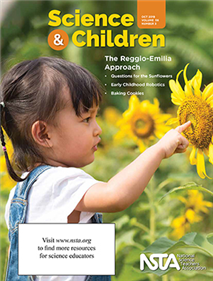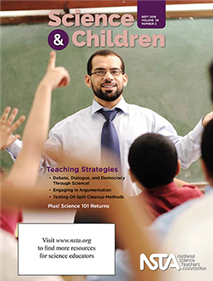All NGSS resources
Journal Article
The Early Years: Analyzing Media Representations of Animals
This column discusses resources and science topics related to students in grades preK to 2. This issue aims to engage children in analyzing and interpreting illustrations to determine sizes of pictured animals and give evidence for how they know. To ...
Blog Post
Exploring Structure and Function in Insects
As an entomologist, one of my greatest challenges is trying to overcome my students’ feelings of fear and disgust regarding insects. Insects often have negative images in society. Walk through any toy store, and you will likely find plastic insects...
By Cindy Workosky
Blog Post
Using Toxic Algal Blooms to Teach Structure and Function
Young children often experience a developmental stage in which they question everything. Why aren’t there dinosaurs anymore? Why do cats purr? Why are some potato chips green? They go from simply observing their surroundings to analyzing, experimen...
By Rebecca Brewer
NSTA Press Book
Swing Set Makeover, Grade 3: STEM Road Map for Elementary School
What if you could challenge your third graders to design a swing set that’s safe but still lots of fun? With this volume in the STEM Road Map Curriculum Series, you can!Swing Set Makeover outlines a journey that will steer your students toward auth...
Journal Article
The Early Years: Creating a Possibility-Rich Classroom Environment
This column discusses resources and science topics related to students in grades preK to 2. This issue describes an activity that creates a “possibility-rich” environment or experience for children to have firsthand experience with phenomena or d...
Blog Post
Scaffolding the Practice of Asking Questions and Defining Problems
With the adoption of the Next Generation Science Standards (NGSS), teachers are wondering how to teach their students to do the science and engineering practices (SEPs). Some SEPs, such as carrying out investigations and analyzing data, are a natural...
By Cindy Workosky
NSTA Press Book
Car Crashes, Grade 12: STEM Road Map for High School
What if you could challenge your 12th graders to understand car crashes in the context of physical forces, manufacturing challenges, government safety standards, and individual rights? With this volume in the STEM Road Map Curriculum Series, you can!...
NSTA Press Book
Engineering in the Life Sciences, 9–12
When the authors of this book took part in Project INFUSE, the National Science Foundation–funded teacher development program, they noticed something. Life science teachers were highly receptive to engineering ideas related to everything from genom...
By Rodney L. Custer, Jenny L. Daugherty, Julia M. Ross, Katheryn B. Kennedy, Cory Culbertson
Journal Article
The Early Years: Begin With Open Exploration
This column discusses resources and science topics related to students in grades preK to 2. This issue discusses ways to encourage children to engage in open exploration to learn about living organisms....
Blog Post
First-Graders Modeling Day and Night: Making Sense of a Phenomenon
As a first-grade teacher in Detroit with predominantly Latinx students and English language learners, I worked for several weeks at the end of last school year with a doctoral candidate in science education and former elementary teacher, Christa Have...
By Cindy Workosky
Blog Post
Recently, my colleagues and I had an exchange with some teachers in one of our professional development programs. One teacher said, “I think I do a lot of modeling in my class. I have my kids draw pictures of the science ideas they are learning all...
Blog Post
Modeling in Science Instruction
With the shift toward three-dimensional teaching and learning that the Next Generation Science Standards requires, the Crosscutting Concept of Modeling has become a major focus of my instruction. I use a process that involves revisiting the sam...
By Cindy Workosky






